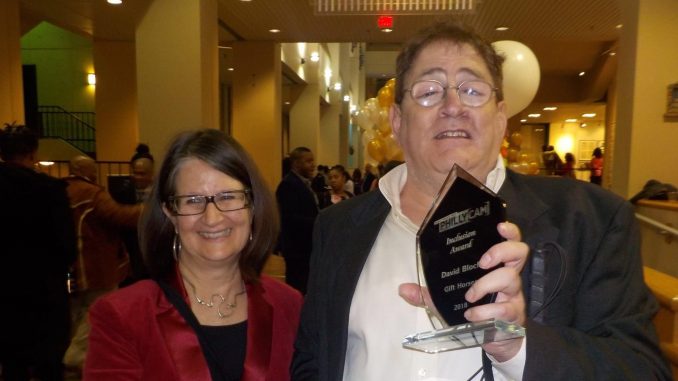
It started with an article in The New York Times.
The piece was about goalball, a popular sport for people with blindness similar to soccer. Players stay on their hands and knees and aim to throw a basketball-sized ball with bells inside into the opposing team’s goal.
After the 1990 article published, 2017 master’s of journalism alumnus David Block decided to start telling deeper stories in a more visual way by making documentaries — despite being blind.
“I had done as much as I could with goalball, and now I wanted to make a film on it,” Block said. “That’s where everything got going.”
Block is legally blind, which means he can see an object 20 feet away that a person with unimpaired vision can see at 200 feet away. Block, 55, was born with congenital cataracts, so his lenses were cloudy and had to be removed.
But that hasn’t stopped him from pursuing a successful journalism career. Block has directed and produced eight documentaries and written more than 1,500 articles, covering everything from the Penn Relays to jazz musicians. His documentary “Gift Horses,” won the Inclusion Award at the CAMMY Awards last month.
Run by PhillyCAM, a nonprofit community-run public access media organization that promotes creative expression, democratic values and civic participation, the CAMMY Awards recognize creatives whose content reflects these principles.
“Winning the award for ‘Gift Horses’ made me feel better than my antidepressants,” Block said.
In the documentary, Block shows how horse therapy can have positive physical and emotional effects for people with disabilities. According to the Ismael Pinto Equine Therapy Association, a nonprofit in Spain, horse therapy can increase muscle tone, self-esteem, attention span and social interactions.
Block visited several Pennsylvania equestrian centers to interview horse owners and riders for the film, including Thorncroft Equestrian Center in Malvern, Pennsylvania, where he used to ride horses.
One person in the documentary who has cerebral palsy learned to walk after horse therapy, while a person with autism spoke for the first time.
Block said his blindness makes him more compassionate for other people with disabilities.
“I have had similar experiences not being treated well, not getting along in society, feeling awkward,” Block said. “It gave me a special empathy for them that I may not have had if I weren’t disabled. It’s a special bond.”
He doesn’t let his visual impairment affect his creative process and doesn’t use special equipment during the filmmaking process. He hires people to shoot and edit the footage while he reviews it and transcribes interviews.
“I’ve been legally blind my entire life,” Block said. “I can’t compare it to seeing perfectly because I was never able to see perfectly.”
Some of his former professors noted Block’s passion and dedication to reporting.
“He always had a real interest in the ways which journalism and nonfiction storytelling can highlight undertold stories and stories that illuminated a broader human condition,” said journalism professor Brian Creech.
Media studies production professor Clemencia Rodríguez taught Block in a class that focused on community-based media like PhillyCAM.
“[Block] connected with the idea that community media are media technologies for people who have generally been marginalized from media production,” Rodríguez said. “It was very interesting for him to explore and reflect on people with disabilities and their access to technology as media producers.”
Before attending Temple, Block worked for more than 25 years as a journalist and interviewed celebrities like Caitlyn Jenner and Sammy Skobel, a legally blind roller derby player popular in the 1940s and 50s.
Block said his piece on Skobel is his greatest career accomplishment. It was one of the four stories Block had published in The New York Times.
Making the jump from print to multimedia journalism came naturally, he said. Block realized once people finish reading a newspaper, they forget what they read five minutes later.
“If you put the images on the screen, people will remember the images longer,” Block said. “It’s ironic that a half-blind guy would have that idea, but it makes sense. Seeing is believing.”
Block now plans to focus on publishing two books, one explaining the 613 Mitzvot, or commandments of Judaism, and a collection of fictional short stories about people with blindness.
“I’ve made eight documentaries to date,” Block said. “I have no children, but I would say those films are the closest things to children I have ever had.”



Great article that I’m sure can inspire others with disabilities to see there is so much that they can accomplish. Congratulation David on your great work. It shows your courage, empathy and sense of humor.